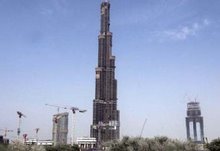Monday, September 24, 2007
Obtaining a work permit
By Bassma Al Jandaly, Staff ReporterPublished: September 21, 2007, 23:15
Dubai: The UAE labour law and the residency regulations for expatriates are almost the same in the seven emirates.
If you are planning to come here and work you need to obtain a work permit and should be sponsored by a company which must be licensed and registered with the Ministry of Labour.
If you are planning to invest here by setting up a company in partnership, you will be sponsored by a government department and your residency visa will be under the responsibility of the residency department of the emirate.
Work permits for individuals working in a company in the private sector will be issued by the Ministry of Labour.
If you find a job in UAE through any of the recruitment agencies here, you do not have to pay them any fees to find the job for you because they are paid by the employer who is hiring you. There are specific requirements and conditions to be able to work in the UAE. First, you should not be less than 18 years old and not more than 60 years.
But if your employer needs you, the age limit can be extended to 65 years, but with the approval of the Minister of Labour. The labour contract, labour card and residency visa will be valid only for one year and has to be renewed.
To work in the UAE, you should be the holder of a professional degree or have the skill sets that are needed in the UAE labour market.
Before applying for a work permit in the UAE, make sure that your passport is valid for at least six months. If you have diseases such as Aids or TB, your work permit will be cancelled.
All workers must have three copies detailing the labour contract in Arabic or English which must be approved by the Labour Ministry.
It is important that your employer should apply for a labour card for you immediately after joining work. The card is valid for three years and should be renewed within 60 days of expiry in accordance with the worker's labour contract.
A medical health check is needed as part of the employment process in the UAE.
All your employment costs which include labour permit, labour contract and labour card, medical health check and other fees or fines related to your employment, must be paid by your employer.
If your employer fails to issue you the labour card or did not renew it you can complain at the Labour Dispute department at the Ministry.
Your working hours will be eight hours a day or 48 hours a week. The working hours may be decreased or increased if approved by the Ministry of Labour and depending on the nature of your work. According to the Labour Law, working hours must be shortened by two hours in Ramadan. Friday is the weekend for all workers, except for the daily unskilled worker.
Key facts: When availing annual leave
- Muslim workers are granted leave for Haj or pilgrimage once during their term of service. It is unpaid leave and is not calculated with the other days off. It is not more than 30 days.
- All workers are entitled to an annual leave for each year of their service. If you have spent three months of continuous service after the probation period, but then fell ill, you can apply for 90 days sick leave, the first 15 days are fully paid, the next 30 days are half salary and the rest are unpaid leave.
- Women are entitled to maternity leave of 45 days with full pay, including the period before and after delivery, if she has completed one year of service, otherwise the leave is half-pay.
- The working woman can stop working for a maximum period of 100 days without pay, which is not calculated with other leaves, if it is taken because of an illness. It must be proved by a medical certificate attested by an authority.
- You should join your work straight away after the end of your annual leave or any other leave.
- You should keep your passport with you. It is illegal and against Interior Ministry law for your employer or for anybody to hold your passport for any reason.
- You should not abscond from your work or you will face strict penalties.
Dubai: The UAE labour law and the residency regulations for expatriates are almost the same in the seven emirates.
If you are planning to come here and work you need to obtain a work permit and should be sponsored by a company which must be licensed and registered with the Ministry of Labour.
If you are planning to invest here by setting up a company in partnership, you will be sponsored by a government department and your residency visa will be under the responsibility of the residency department of the emirate.
Work permits for individuals working in a company in the private sector will be issued by the Ministry of Labour.
If you find a job in UAE through any of the recruitment agencies here, you do not have to pay them any fees to find the job for you because they are paid by the employer who is hiring you. There are specific requirements and conditions to be able to work in the UAE. First, you should not be less than 18 years old and not more than 60 years.
But if your employer needs you, the age limit can be extended to 65 years, but with the approval of the Minister of Labour. The labour contract, labour card and residency visa will be valid only for one year and has to be renewed.
To work in the UAE, you should be the holder of a professional degree or have the skill sets that are needed in the UAE labour market.
Before applying for a work permit in the UAE, make sure that your passport is valid for at least six months. If you have diseases such as Aids or TB, your work permit will be cancelled.
All workers must have three copies detailing the labour contract in Arabic or English which must be approved by the Labour Ministry.
It is important that your employer should apply for a labour card for you immediately after joining work. The card is valid for three years and should be renewed within 60 days of expiry in accordance with the worker's labour contract.
A medical health check is needed as part of the employment process in the UAE.
All your employment costs which include labour permit, labour contract and labour card, medical health check and other fees or fines related to your employment, must be paid by your employer.
If your employer fails to issue you the labour card or did not renew it you can complain at the Labour Dispute department at the Ministry.
Your working hours will be eight hours a day or 48 hours a week. The working hours may be decreased or increased if approved by the Ministry of Labour and depending on the nature of your work. According to the Labour Law, working hours must be shortened by two hours in Ramadan. Friday is the weekend for all workers, except for the daily unskilled worker.
Key facts: When availing annual leave
- Muslim workers are granted leave for Haj or pilgrimage once during their term of service. It is unpaid leave and is not calculated with the other days off. It is not more than 30 days.
- All workers are entitled to an annual leave for each year of their service. If you have spent three months of continuous service after the probation period, but then fell ill, you can apply for 90 days sick leave, the first 15 days are fully paid, the next 30 days are half salary and the rest are unpaid leave.
- Women are entitled to maternity leave of 45 days with full pay, including the period before and after delivery, if she has completed one year of service, otherwise the leave is half-pay.
- The working woman can stop working for a maximum period of 100 days without pay, which is not calculated with other leaves, if it is taken because of an illness. It must be proved by a medical certificate attested by an authority.
- You should join your work straight away after the end of your annual leave or any other leave.
- You should keep your passport with you. It is illegal and against Interior Ministry law for your employer or for anybody to hold your passport for any reason.
- You should not abscond from your work or you will face strict penalties.
Subscribe to:
Post Comments (Atom)






No comments:
Post a Comment